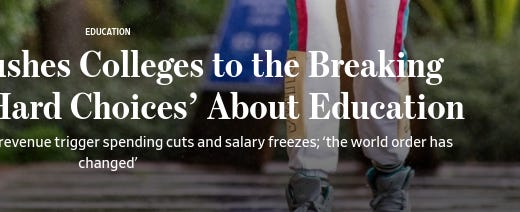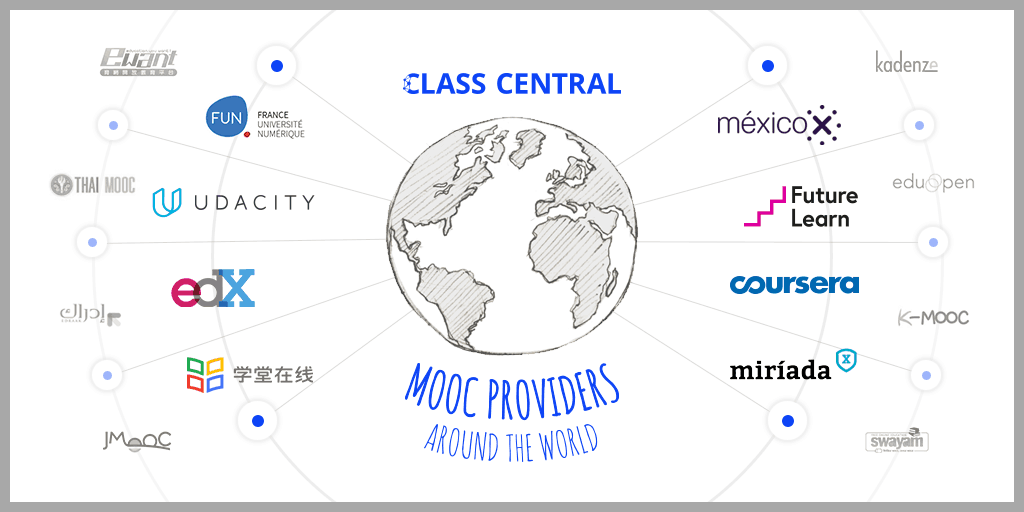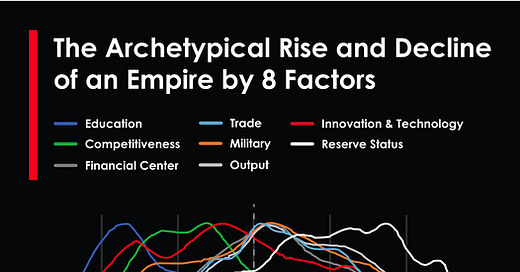
Subscribe below to read my thoughts on edtech’s impact to higher education and updates on my journey building MyMBA in public.
Before the pandemic, traditional higher education institutions faced headwinds from rising costs, political backlash due to increased tuition, and decreased enrollment. The COVID-19 pandemic exacerbates these issues and adds additional problems. The Wall Street Journal reported in a recent article that, “For many schools, the pandemic is exposing flaws in their own business models. Even before the virus hit, many colleges and universities were running on razor-thin margins, with 30% of those rated by Moody’s Investors Service showing operating deficits.”
In addition, The Journal notes that Robert Zemsky, a professor at the University of Pennsylvania’s Graduate School of Education, worries that 200 of the 1,000 private liberal arts schools could close in the next year.
This poses questions about the future of education. What does the future look like with fewer traditional educational opportunities? If these schools go bankrupt or cut existing unprofitable programs, which players will fill the void?
People will still have the desire to learn and to advance or start their career. Where will they go in this new world? Many predict that the Fall 2020 semester will not look like the ones before it. Some may take a gap year to assess their situation. Others may consider different options that they weren't considering before the pandemic (trade schools, opting out of college, or online opportunities). Many graduate programs like MBA programs are facing similar issues.
With these forces in motion, I have attempted to identify the online landscape of higher education. This list is not exhaustive, but rather, it gives an overview of the current market.
I have identified the players falling into these 5 groups:
The Incumbents: Existing schools that leverage their brand to move education online in formal degree programs
The MOOCs: Open courses available to the masses. These are low cost, low barriers to entry and also leverage the brands of established institutions
The Bootcamps: These are results driven programs focused on job placement and tangible skill building
YouTube: Some say the greatest learning tool in history
Teachable and the Professionals: Experts in niche areas creating programs to help interested people build a skill
The Incumbents:
These are established higher education players that use their experience in education to move their popular courses online. These players have their reputation to use to their advantage.
For example, the Carnegie Mellon’s Tepper School of Business uses its brand to build an MBA program available from anywhere in the world.
Similarly, Purdue has diversified its traditional offering to move programs onto Purdue Global.
“This is innovation. This is extreme personalization. This is a world-class education that's tailored to the unique needs of working adults. Now you can earn a degree from an accredited online university that is part of the respected Purdue University system.”
The reputation of the University helps the schools attract students and employers.
Many reputable Universities now offer established and successful online degrees. There are similar online graduate programs for engineering, nursing, and more. These have the highest price point for any online learning option and graduates are granted a traditional diploma.
The MOOCs:
The incumbents are tied closely with MOOCs (Massive Online Open Courses). Stanford started a revolution in 2011 when they began putting their classes online for free. Since then, many Universities have put their courses online. On Coursera, you can audit many of the classes for free. MOOCs are available in a variety of formats. ClassCentral is a MOOC aggregator and discovery platform that connects learners to online courses based on their interests.
Some of the popular MOOCs are available through the following:
EdX: Open online learning & course delivery system featuring content from 28 major universities around the world (Link).
MIT OpenCourseWare: Online library of MIT course materials from almost all the subjects taught at MIT (Link).
Coursera: Courses taught by professors of leading universities in US, UK, Canada (Link).
Udacity: Plan your career and secure in-demand tech skills online. (Link).
MOOCs provide access to high caliber education to everyone with an internet connection.
(Source)
There is also a developing trend in higher education called “upskilling.” Upskilling is when companies focus on internal training and improving their existing employees skill set. Although it's not a perfect fit, I put this category within MOOCs. Companies use Udemy or LinkedIn Learning to train their employees in hopes of increasing retention. This is a vector away from traditional higher education. One can imagine an “Amazon University” where Amazon trains employees in house rather than hiring from an existing University.
Bootcamps and Lambda School
Founded in 2016, Lambda School has received press over a new model for online education. Focused on coding, Lambda School offers students the opportunity to begin learning for free. In return, students can enter an income share agreement in which they pay a portion of their future income.
There are countless coding bootcamps online similar to Lambda School. Bootcamps like Le Wagon or Flatiron School offer coding and data science training. These sources focus on real results, fast paced learning, job placement, and quick salary increases.
Bridging the gap between bootcamps and traditional schools, there is the Make School. They would probably not be happy to be lumped in with bootcamps as they offer an accredited bachelor's degree. In addition, they are more traditional as they are an in person experience. However, they are similar to a bootcamp in that it is a short time horizon (2 years). Also, they focus on computer science and work as an Income Share Agreement (similar to Lambda School). Make School is interesting because it is new yet already reputable. It has borrowed many aspects from the traditional college experience but it has made impactful changes (tuition, time, curriculum).
Bootcamps function with an end in mind. Praxis is a bootcamp started by Isaac Moorehouse that operates as more of an apprenticeship alternative to college. With Praxis, you gain skills with the hope of landing a job without a college degree.
YouTube:
Some say that YouTube is the greatest educational resource in history. Whether you need help fixing your car or learning accounting, YouTube has a video for just about anything.
There are formalized YouTube channels for specific learning:
Crash Course: Playlists for many topics mainly geared at high school students
Stanford Graduate School of Business: a collection of talks by famous business leaders given at Stanford's Business School
Teachable and the Professionals:
Teachable is a software company that allows people to easily build courses online.
These are online classes created by people passionate about a certain subject. For example, on Teachable, the famous author of "Atomic Habits", James Clear, has created "The Habits Academy" teaching people how to create better habits.
Similarly, professionals like David Perell train people in their specific niche. Perell has created a course about writing called the Write of Passage.
Conclusion
Online learning will not replace in person learning. However, at the margin, and especially with the impact of the current health crisis, online learning will be a useful tool to learn and advance careers. Online learning faces difficulties with credentialing. Can employers trust that their applicant really learned that material if it was online? Also, what if that online education was from a new institution without a hundred year reputation? I believe that the stigma of online credentialing will fade as I write here: Dating apps predict the fall of the college system.
Lambda School proves that it is possible to gain a reputation in a short time span. As such, there is potential for new players to enter the landscape and make changes over the next decade. At this point, there are many paths and possibilities to what the future will look like.
Will the incumbents maintain their market share and effectively move online? Or, will other schools emerge with more efficient and cost effective approaches? If so, do bootcamps take the market share or do companies upskill their employees so they do not have to return for an education? Otherwise, is there something completely new we haven't seen yet ready to take the lead as traditional universities struggle?












